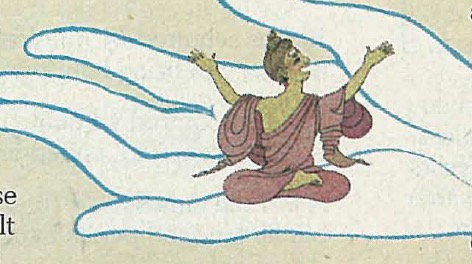By the Editor
Ah, religion, that sober, somber, somniferous science, so soulful and oh-so-solemn. Perhaps. But only one whose funny bone has been surgically removed would remain unaware of the rich, even zany, Hindu comic tradition (believe me, writing a humorous editorial for Islam Today or Shintoism Today would pose greater challenges). That it is widely ignored may be due to the fact that India’s cultural and philosophical gifts are often approached with reverence, even awe. So the playful parodies perish, whacky wisdom is waived and mirthful merriment maligned. This is a loss for us all. In his Anatomy of Satire, Gilbert Highet noted, “If you want to understand any age, you ought to read not only its heroic and philosophical books, but its comic and satirical books.” In Indian aesthetics, comedy is called hasya-rasa (from hasa, laughter) and is one of nine “tastes,” of which some others are heroism, fear, tranquility and love.
As with most things plebeian and profound, Indian humor has established a beachhead on the World Wide Web. An AltaVista search returned 6,000 pages (and that’s just the English). Most of it is laughably disappointing. Among the best we found: http://www.webhead.com/wwwvl/india/india208.html; http://w2.meer.net/users/genius/indolink/Humor/index.html; http://members.aol.com/indialinks/humor.htm; and http://ugweb.cs.ualberta.ca/~srinivas/india/humor/
Humor is rampant in Hindu literature, both sacred and secular. The Rig-Veda rishis jested about the ordinary human state of mind, full of imaginings and opportunism: “Our thoughts wander in all directions and many are the ways of men: the cartwright hopes for accidents, the physician for the cripple, the priest for a rich patron and the frog for a pond to plunge into. For the sake of Spirit, O Mind, let go of these wandering thoughts” X.112.1. In the same Veda (X.121) there are clever metaphysical puns in the Hymn to Who that presage Abbot and Costello’s “Who’s on first?”
Where else is there laughter in Heaven, bantering among the Gods? In most faiths, there’s rarely a smile in the sacred texts, and heaven and its denizens are seldom viewed as having a lighthearted side. Yet laughter is so wonderfully human, so natural and somehow necessary for a full and healthy life, whether here or hereafter. It seems destined that the Divine would have immense capacity for the joy and fun He built into His creation.
The Puranas are filled with bawdy (sometimes salacious) jests and amusing deceits. The Mahabharata excels in its mastery of trickery and satire. In folktales, there is, of course, the magical Panchatantra, one of the world’s greatest collections of fables, filled with repartee, jest and jocularity–all in the name of learning about life. As the true story of the Panchatantra goes, a Kashmiri king who lived over 2,000 years ago had three blockhead sons. He found they learned best through illustrations, and gathered master storytellers to weave parables about friendship, money, bad conduct and such. Children love these, and if readers have never encountered them, you should. One of the finest translations from the Sanskrit is by Arthur Ryder in an edition by the University of Chicago Press.
The stories of Birbal are rich. Raja Birbal (1528-1583) was an impoverished but witty brahmin writer who became one of Emperor Akbar’s favorites. The tension between Hindus and Muslims in Akbar’s court was real in those days, and Birbal had an uncanny ability to leaven it with levity. Their comic battle was waged at the expense of his Muslim brothers, though sometimes Akbar himself was the target. One day Akbar lamented to Birbal, “As emperor, I am allowed to meet only wise and learned men. Show me the ten greatest fools in the kingdom.” Birbal brought him a collection of morons, figures typical of the fool in Indian literature: the first man, riding a horse, carried a bundle of firewood on his head, reasoning that the burden would be too heavy for the horse if he placed it on the saddle; another was found looking at night for a ring he had lost, searching not where he dropped it in the dark under a tree, but in a nearby clearing where the light was better. Birbal brought eight such simpletons to the king who soon reminded him that he had asked for ten. “There are ten,” the trickster laughed, “including you and me–the two biggest fools of all–you for giving me such a ludicrous order, and me for obeying it!”
Of Indian humor, Lee Siegel, who spent five years studying it, says, “At the core of Indian comedy there is an irony, a revelation of the humanness of the Gods and the divinity of human beings. The human comedy has two heroes–the fool and the trickster. The divine comedy recapitulates the human. The trickster and fool find their wholeness embedded in consciousness as the laughing child, and that child is deified as Krishna. As that God has been examined for the ways in which He reveals the seriousness of humor and its capacity to affirm life, so Siva has been invoked to indicate the humor of seriousness–the ludicrousness of all human endeavors in the face of death.” Both Krishna and Siva sanctify humor, but in different ways. Krishna giggles and teases, Siva roars with the ascetic’s scoff. Either way, their laughter links Heaven and Earth.
This not-so-serious side of Hinduism is evident in saints and sages. Some consider wittiness a warrant of egolessness and spiritual attainment, for the greatest souls are often jovial, and many go for the jocular vein. Ramakrishna was notoriously playful, as was Muktananda in recent times. Many outstanding swamis today are farce-seeing humorists, tickling us with words until we weep with laughter, drolling all over ourselves. Then they smile that know-it-all grin that tells the world they know something it doesn’t. Why not? They are liberated, done with sorrow. You’d be happy, too! Laughter can be an embrace with Loving Existence, a self-transcendent sharing of the essence of things, of Brahman’s inmost heart, our innermost Self. Humor is like God. You can’t explain it. Either you get it or you don’t.


